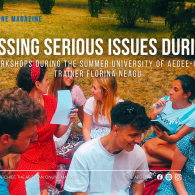As AEGEEans we all know how much fun Summer Universities are. It’s that time of the year when we all get the opportunity to explore new regions and cultures —and of course love the program and the parties that the respective antennas organise. However, SUs are also a great place to learn something new about the important issues of our… Read more →





